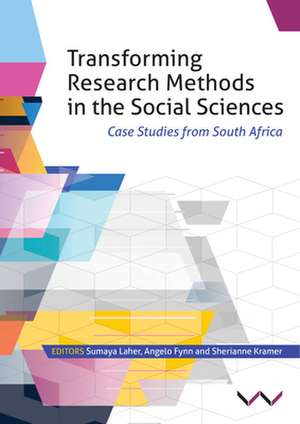Transforming Research Methods in the Social Sciences: Case Studies from South Africa
Autor Angelo Flynn, Sherianne Kramer Editat de Sumaya Laheren Hardback – 28 feb 2019
Social science researchers in the global South, and in South Africa particularly, utilise research methods in innovative ways in order to respond to contexts characterised by diversity, racial and political tensions, socioeconomic disparities and gender inequalities. These methods often remain undocumented - a gap that this book starts to address. Written by experts from various methodological fields, Transforming Research Methods in the Social Sciences is a comprehensive collation of original essays and cutting-edge research that demonstrates the variety of novel techniques and research methods available to researchers responding to these context-bound issues. It is particularly relevant for study and research in the fields of applied psychology, sociology, ethnography, biography and anthropology. In addition to their unique combination of conceptual and application issues, the chapters also include discussions on ethical considerations relevant to the method in similar global South contexts. Transforming Research Methods in the Social Sciences has much to offer to researchers, professionals and others involved in social science research both locally and internationally.
| Toate formatele și edițiile | Preț | Express |
|---|---|---|
| Paperback (1) | 316.23 lei 6-8 săpt. | +76.78 lei 7-13 zile |
| Wits University Press – mar 2019 | 316.23 lei 6-8 săpt. | +76.78 lei 7-13 zile |
| Hardback (1) | 594.10 lei 6-8 săpt. | |
| WITS UNIV PR – 28 feb 2019 | 594.10 lei 6-8 săpt. |
Preț: 594.10 lei
Preț vechi: 771.56 lei
-23% Nou
113.68€ • 118.41$ • 94.77£
Carte tipărită la comandă
Livrare economică 29 martie-12 aprilie
Specificații
ISBN-10: 1776144600
Pagini: 528
Dimensiuni: 152 x 229 x 30 mm
Greutate: 0.84 kg
Editura: WITS UNIV PR
Descriere
Social science researchers in the global South, and in South Africa particularly, utilise research methods in innovative ways in order to respond to contexts characterised by diversity, racial and political tensions, socioeconomic disparities and gender inequalities. These methods often remain undocumented - a gap that this book starts to address.
